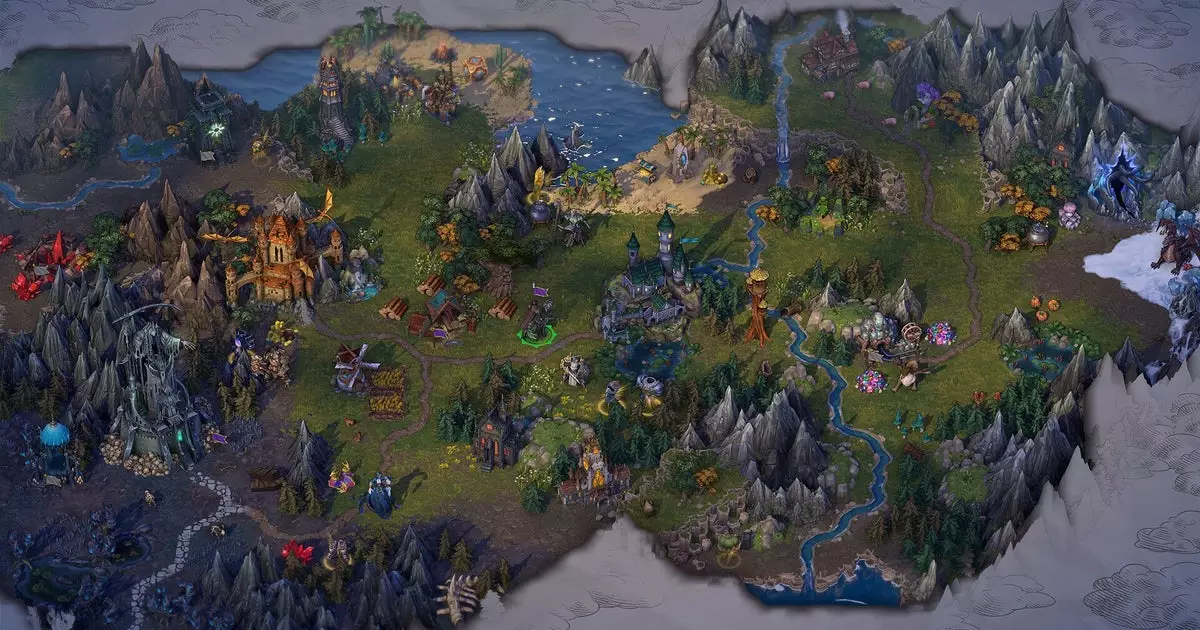In a surprising turn of events, Ubisoft has decided to entrust the publishing duties of their beloved Heroes of Might and Magic: Olden Era to a third-party company, Hooded Horse. This move marks a notable departure from traditional publishing practices, reflecting the evolving dynamics within the gaming industry where large corporations are increasingly open to external collaborations to maximize potential returns and market reach. Instead of standing as the sole guardian of their historic franchises, Ubisoft is now leveraging specialized publishers—ones with targeted expertise and passionate communities—to cultivate sustained interest and perhaps, streamline profitability.
From a strategic standpoint, this decision is rooted in Pragmatism rather than creative retreat. Ubisoft’s internal turbulence—signified by their recent corporate restructuring into separate entities—may be pushing them toward leaner operational models. Splitting into divisions focused on different IPs allows for more focused investment, but it also fragments resources, possibly limiting their ability to handle every project internally, especially niche titles like Heroes of Might and Magic. Thus, partnering with Hooded Horse, an accomplished publisher with a dedicated fanbase in strategy circles, could be viewed as an astute maneuver designed to optimize output without exhausting their core resources.
What’s in It for Both Parties?
This arrangement hints at a symbiotic relationship where Ubisoft retains ownership of the IP—remaining the ultimate guardian of the franchise—while Hooded Horse assumes the logistical and marketing responsibilities crucial for the game’s success. The promise of increased visibility and expanded regional reach from Hooded Horse’s rich network suggests Ubisoft might be banking on their partner’s niche expertise to breathe new life into an aging franchise. Meanwhile, Hooded Horse benefits from an association with a globally recognized publisher and access to one of the most cherished strategy properties in gaming history.
The motivations here are multi-layered. For Ubisoft, this could be a tactical reduction of risk and overhead, allowing them to focus on larger, more lucrative projects while still maintaining strategic stakes. For Hooded Horse, the opportunity to publish such a heralded franchise elevates its credibility and could serve as a springboard for future titles. Yet, beneath the surface, questions linger: is this a reflection of Ubisoft’s overstretched resources, or a calculated maneuver to seed new revenue streams through proven intellectual property?
Potential Impact on the Franchise and the Industry
The decision to switch publishers might catalyze a renaissance for Heroes of Might and Magic. External publishers with concentrated communities and targeted marketing strategies can often generate a more eager and loyal audience, especially if they understand the core fanbase’s desires. The fact that Hooded Horse is heavily invested in strategy genres gives hope that the Olden Era will adhere tightly to the roots that long-time fans cherish.
However, this arrangement also introduces risks. Large publishers like Ubisoft have historically had the resources to sustain long-term franchise development and manage community relations at a grand scale. Entrusting this to a smaller publisher could lead to gaps in support or misalignment with fan expectations, especially considering the franchise’s legacy dating back to 1995—a history rich with lore, complexity, and dedicated players.
Moreover, the decision underscores a larger industry trend: the diminishing influence of monolithic publishers and the rise of specialized, boutique strategists capable of nurturing niche titles. This movement could democratize gaming success, providing smaller publishers with opportunities to steer beloved franchises in innovative directions, but it also raises questions about consistency, quality, and brand integrity.
The Broader Economic Context: Cost-Cutting and Strategic Realignment
Ubisoft’s ongoing internal reshuffle signifies a broader industry pattern of cost management and strategic refocusing. The split into separate entities for flagship AAA franchises versus other projects appears to be a savvy, if somewhat opaque, business decision aimed at increasing agility and reducing internal bureaucracy. The deal with Hooded Horse may serve as a cost-efficient solution to marketing and distribution challenges, circumventing the need for massive internal campaigns for every release.
Additionally, with Ubisoft warning about delays and operational challenges, this approach might be a pragmatic hedge against inflated costs and unpredictable timelines. By deploying an external publisher with proven expertise, Ubisoft can continuously keep their beloved series alive in the public eye without overextending their internal teams. In essence, this move exemplifies how mega-corporations adapt, adopting flexibility while safeguarding core assets from overexposure or mismanagement.
A Future Shaped by Collaboration and Niche Expertise
While the full implications remain to be seen, the partnership between Ubisoft and Hooded Horse is emblematic of a broader shift towards collaborative models that prioritize strategic specialization over traditional ownership. For fans of Heroes of Might and Magic, this could herald new opportunities for revitalization—provided the core vision and heritage are preserved.
Yet, the key question is whether this strategy will truly resonate with veteran players, who often value authenticity and depth derived from decades of lore and storytelling. If Hooded Horse can harness its niche expertise to deliver a game that honors the franchise’s roots while introducing innovative mechanics, it might not only succeed commercially but also reignite the franchise’s relevance in an increasingly crowded market.
Ultimately, this move epitomizes a fundamental truth of modern gaming: in a rapidly changing landscape, adaptability, strategic partnerships, and a willingness to experiment are essential for longevity. Ubisoft’s gamble on outside publishing partners demonstrates a nuanced understanding of industry evolution, one that could ultimately redefine how legendary franchises are managed and revitalized in the years ahead.


Leave a Reply